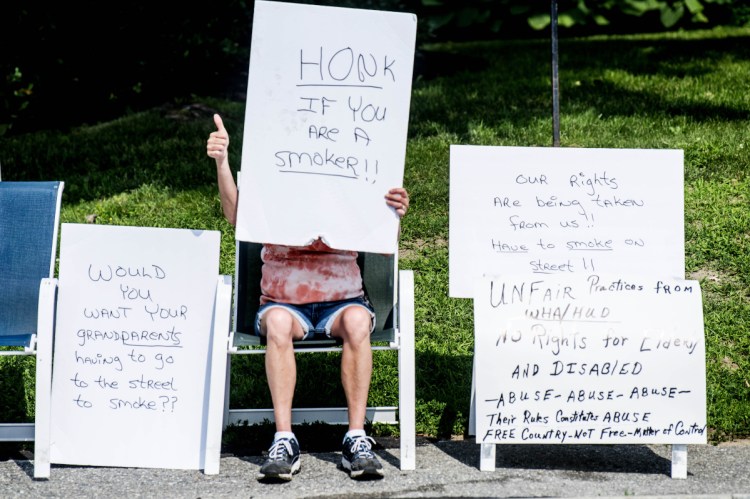WATERVILLE — Dorothy Gilley and Guy Farmer were having a cigarette on a recent afternoon on the sidewalk outside their apartments at Elm Towers.
The location was less than ideal.
“In the wintertime, we’re going to have to come out here, along with the handicap and elderly people,” said Farmer, 55. “There are some 90-year-old people who can’t walk to the sidewalk or across the street.”
His companion pointed to the sidewalk littered with cigarette butts.
“It’s already starting to look like a mess out here,” Gilley said.
Since 2009, tenants of the Waterville Housing Authority haven’t been allowed to smoke in housing authority buildings, but a new policy implemented July 1 is now extending that to all Waterville Housing Authority property, including outside grounds and parking areas.
The change has some tenants, such as Gilley and Farmer, upset and worried about the feasibility for elderly and handicapped residents.
Some have protested outside the Elm Towers building in the July heat with signs that say, “Our rights are being taken from us,” and “Unfair practices from WHA/HUD. No rights for elderly and disabled.”
“I can understand not wanting people to smoke in the building, but taking it away from the property?” said Gilley, 72. “We have a gazebo and a picnic table. It looks ridiculous, all these people out here smoking on the sidewalk.”
The changes in Waterville stem in part from a 2016 rule implemented by the U.S. Housing and Urban Development Department requiring all federally funded public housing agencies to implement smoke-free policies within 18 months.
The rule doesn’t require housing authorities to ban smoking completely on their properties; it calls for a ban only in indoor common areas, apartments, administrative buildings and within 25 feet of all buildings. However, Waterville Housing Authority Executive Director Diane Townsend said the rule has prompted some housing authorities to take a stricter approach to smoking.
“I understand it’s difficult, but at the same time we’re following along with a trend and trying to improve the quality of life for people who don’t choose to smoke,” she said. “We’re not trying to upset people. We’re trying to make life good for everybody.”
In Bangor, the Bangor Housing Authority implemented more restrictive smoking rules in January by banning additional types of smoking, such as electronic cigarettes and the smoking of marijuana, from its buildings, according to general counsel Joseph Bethony. He said the question of whether to ban smoking completely from housing authority premises has not come up.
“I can understand why they would want to enact a ban like that,” Bethony said. “It’s important for any housing authority to have a smoking policy that provides a healthy environment for all its tenants and employees.”
In Portland, Housing Authority Executive Director Mark Adelson said the authority doesn’t ban smoking completely on its properties, but he has heard of others that do.
“It’s definitely becoming more common, these campus-free smoking policies,” Adelson said. “I would say among housing authorities in Maine, it’s about 50-50.”
In Waterville, the housing authority has been implementing increasingly restrictive changes to rules about smoking on its properties over the last decade, starting in 2007 with a policy prohibiting new tenants from smoking in their apartments. In 2009 that was expanded to a ban of smoking in all apartments, common areas and locations within 25 feet of the building, Townsend said.
The latest policy extends the prohibition to parking lots and all outside grounds. In addition to cigarette smoking, residents and visitors may not smoke or use items that produce a vapor similar to smoking, including e-cigarettes, vapor pens, water pipes and hookahs.
Although smoking marijuana is legal in Maine, it is also prohibited in Waterville Housing Authority properties and falls under the new policy because the housing authority is federally funded, Townsend said.
She said it has become increasingly difficult to monitor smoking on properties, especially with the rise of vaping and electronic cigarettes. Even with the 25-feet rule, some tenants still were experiencing secondhand smoke through their windows.
“It’s a step to try and help people,” Townsend said. “I know a lot of people don’t see it that way, but at the same time, it’s also a cost for us. When I go to try and rehab an apartment someone has smoked in, it costs a lot more money because of the damage to the walls and windows. It takes extra cleaning time, often multiple coats of paint. By saying ‘We’re just not allowing this, period, anywhere,’ it helps.”
Elm Towers is one of seven apartment complexes owned and managed by the Waterville Housing Authority. The agency also owns several homes and duplexes that are used as apartments. Other landlords who accept HUD vouchers are not affected by the policy.
Townsend said with the roll-out of the policy, the agency also is offering help to residents who want to quit smoking, including making available literature, speakers and a coordinator to help tenants enroll in smoking cessation classes.
But some residents said if they want to quit smoking, it’s a decision they can make on their own without the help of the housing authority.
“Yes, I’m trying to quit, but I’m doing it for my own personal reasons, not because they dictate that to me,” Gilley said. “It’s a matter of government control, is what it is. It’s not just about smoking. It’s about people having the right to smoke or not if they want to.”
Rachel Ohm — 612-2368
Twitter: @rachel_ohm
Send questions/comments to the editors.




Comments are no longer available on this story